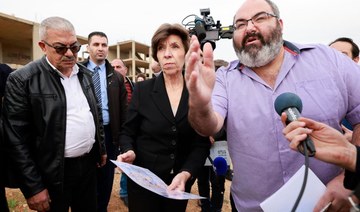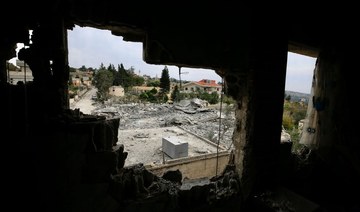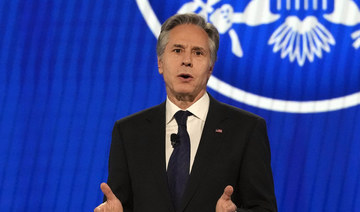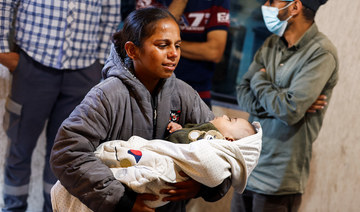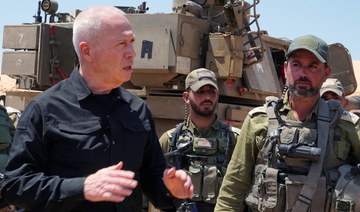BEIRUT: Lebanon is ready to implement a UN resolution that would help end Hezbollah’s cross-border attacks on Israel if Tel Aviv also complies and withdraws from occupied territory, Lebanon’s Prime Minister Najib Mikati said on Friday.
His remarks came as Hezbollah intensified its operations against Israeli military sites amid the heated confrontation on the southern Lebanese front.
UN Security Council Resolution 1701, which ended a 2006 war between Israel and Hezbollah, called for the removal of armed personnel south of Lebanon’s Litani River, except for UN peacekeepers and the Lebanese security forces.
The solution to the latest cross-border hostilities “is the implementation of international resolutions,” including Resolution 1701, Mikati said in his statement.
“We are ready to commit to their implementation, on the condition the Israeli side does the same and withdraws — according to the international laws and resolutions — from occupied territory,” he added.
On Friday, more residents fled their homes in southern Lebanon when Israeli bombing targeted the area.
The UN Development Programme this week published a report providing a preliminary analysis of the impact of the Gaza war on Lebanon and the repercussions of the hostilities in southern Lebanon on the local economy as of Dec. 6.
The report said: “As per the National Council for Scientific Research, or CNRS, 91 towns in Nabatieh and southern Lebanon have faced 1,768 Israeli attacks, including 1,564 airstrikes, 90 incendiary bombs, 62 phosphorus shells, as well as other types of attacks, causing casualties and the displacement of 64,000 civilians scattered across 10 districts.”
The hostilities have directly affected more than 50 villages across four districts — Tyre, Bint Jbeil, Marjayoun and Hasbaya — and destroyed assets and infrastructure, as well as disrupted economic and social services.
Regions that were directly affected by bombing and displacement include all the border villages from Naqoura toward the Shebaa Farms — an area that is 100 km long and 5 km deep.
The Lebanese Ministry of Agriculture reported “the loss of around 47,000 olive trees in the conflict area, representing about 0.44 percent of the total number of olive trees in Lebanon.”
It added that the trees were directly burnt down “due to the use of internationally banned white phosphorous bombs and other explosives.”
The ministry added that the agricultural areas affected by the fires caused by Israel include 97,800 square meters of olive groves, 66,000 square meters of citrus farms and 98,800 square meters of banana farms.
Fires have also ignited in 20,800 square meters of pasture lands.
Moreover, the Agriculture Ministry reported the destruction of a 600-square-meter fodder warehouse and the complete destruction of about 60 agricultural greenhouses.
More than 200,000 birds and chickens and 700 heads of livestock were reported killed, in addition to the destruction of 250 beehives.
In Tyre, fishermen have found it challenging to access fishing grounds due to the conflict.
The report warned that “forest fires caused by white phosphorus bombs significantly impact natural ecosystems, leading to documented incidents of death among mammals, birds and fish.”
It added: “The water infrastructure has been significantly damaged.”
Soil quality in the conflict area had been affected by physical destruction and pollution due to the spread of heavy metals and toxic compounds from explosive weapons, the report said, warning that white phosphorus usage had “further reduced fertility and increased soil acidity.”
Also on Friday, Israeli media reported that a missile and machine gun fire injured several Israeli soldiers on the border with Lebanon.
Israeli media said that “unusual incidents took place on the northern border with Lebanon, and military censorship was imposed on a security event in the north.”
In the afternoon, six missiles were fired from southern Lebanon toward Israeli positions in the Upper Galilee.
Hezbollah announced in the afternoon the targeting of “a gathering of officers and soldiers of the Israeli enemy in Even Menachem with missile weapons, causing confirmed injuries.”
The Lebanese group carried out operations before noon and announced in successive statements that it targeted “a building in the Shomera settlement with a missile launched from Lebanon.”
It then said it had targeted “gatherings of Israeli soldiers in the vicinity of the Shomera barracks with missile and artillery fire, causing direct hits.”
A missile fell near the Nahariya settlement without any sirens sounding.
The Israeli army responded with airstrikes and artillery fire on the Lebanese border area. Jets struck the Labouneh forests south of Naqoura with missiles.
The Israeli shelling of the Ras Naqoura area led to stones flying toward a Lebanese army position in the area. Sirens sounded at the UNIFIL headquarters in Naqoura.
The shelling targeted the outskirts of Aita Al-Shaab, Ramyah, Al-Qawzah, Beit Lif and Jabal Blat near Marwahin, in addition to the outskirts of Tayr Harfa and the Hamoul area in the western sector.
In a statement, the Israeli army said it attacked “military sites as well as terrorist infrastructure of the Hezbollah organization.”
Fighter jets also attacked a series of Hezbollah targets, it added.
Hezbollah mourned two fighters who died in the south: Hussein Ali Ezzedine from the town of Maaroub and Abdul Aziz Ali Maslamani from the town of Al-Shaitiya.
Hezbollah’s Al-Manar channel reported Israeli army soldiers, quoted by the media, as saying that they felt “like sitting ducks on a shooting range” while operating on the border with Lebanon.
The soldiers said: “The pace of events is increasing here; it is a war on everything, and the higher ranks of the army believe everything is fine.”
Mikati: Lebanon ready to apply UN resolution on border if Israel complies
https://arab.news/mx4xy
Mikati: Lebanon ready to apply UN resolution on border if Israel complies

- Southern front sees further escalation as more than 50 villages directly affected
- On Friday, more residents fled their homes in southern Lebanon when Israeli bombing targeted the area
Yemen’s Houthis say they targeted ships in Gulf of Aden, Indian Ocean
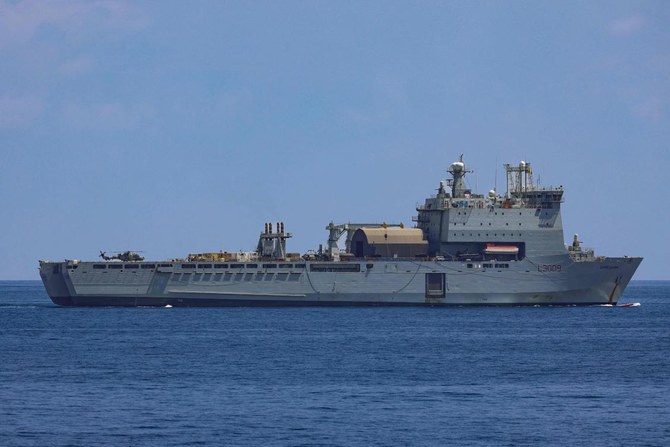
Sarea said the group also targeted the MSC VITTORIA in the Indian Ocean and again in the Gulf of Aden.
Syria shoots down Israeli missiles fired from Golan Heights toward Damascus outskirts
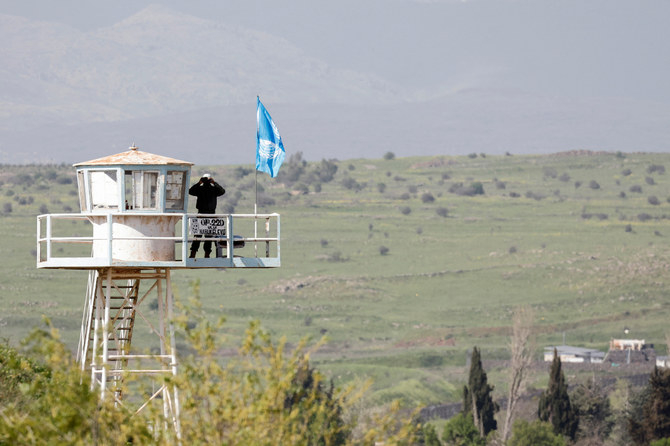
DUBAI: Syrian air defenses on Thursday shot down Israeli missiles fired from the Golan Heights toward Damascus’ outskirts targeting a building in the countryside, Syria’s defense ministry said.
Israel has been carrying out strikes against Iran-linked targets in Syria for years but has ramped up such raids since the Oct. 7 attack by Palestinian armed group Hamas on Israeli territory.
On April 1, an Israeli strike targeted the Iranian embassy compound in Damascus, killing a senior commander in Iran’s Revolutionary Guards Corps as well as other military officers, triggering Iran’s first direct attack onto Israeli territory.
Israel has also been trading fire across its northern border with Lebanese armed group Hezbollah.
‘Constant terror’ in key Darfur city as fighting closes in
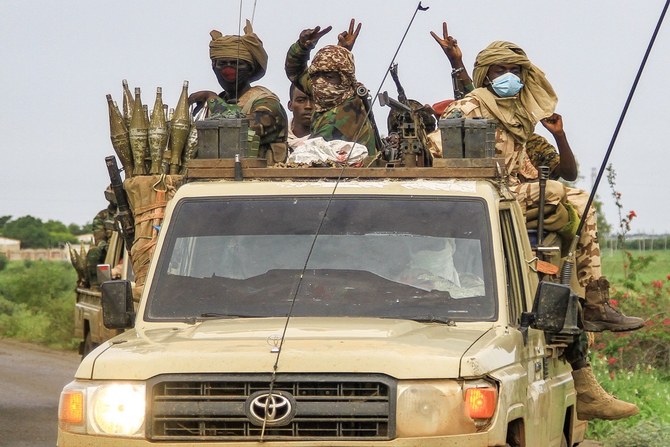
- Experts have warned Sudan is at risk of breaking apart
PORT SUDAN: Sudanese shop owner Ishaq Mohammed has been trapped in his home for a month, sheltering from violence in El-Fasher, the last major city in the country’s vast Darfur region not under paramilitary control.
For more than a year, Sudan has suffered a war between the army, headed by the country’s de facto leader Abdel Fattah Al-Burhan, and the paramilitary Rapid Support Forces (RSF), commanded by his former deputy Mohamed Hamdan Dagalo.
Experts have warned the northeast African country is at risk of breaking apart.
According to the United Nations, Sudan “is experiencing a humanitarian crisis of epic proportions,” with famine threatening and more than 8.7 million people uprooted — more than anywhere else in the world.
Among the war’s many horrors, Darfur has already seen some of the worst. Now, experts and residents are bracing for more.
“We’re living in constant terror,” Mohammed told AFP by telephone, as the UN, world leaders and aid groups voice fears of carnage in the North Darfur state capital of 1.5 million people.
“We can’t move for the bombardments,” Mohammed said.
The RSF has seized four out of five state capitals in Darfur, a region about the size of France and home to around one quarter of Sudan’s 48 million people.
“We’re under a total siege,” another resident, Ahmed Adam, told AFP in a text message that got through despite a near-total communications blackout in Darfur.
“There’s no way in or out of the city that’s not controlled by the RSF,” he said.
For months, El-Fasher was protected by a fragile peace.
But unrest has soared since last month when the city’s two most powerful armed groups — which had helped to keep the peace there — pledged to fight alongside the army.
Since then, El-Fasher and the surrounding countryside have seen “systematic burning of entire villages in rural areas, escalating air bombardments... and a tightening siege,” according to Toby Harward, the UN’s deputy humanitarian coordinator for Sudan.
At least 23 communities in North Darfur have been burned in apparent arson, Yale University’s Humanitarian Research Lab found in a report last week.
The war’s overall death toll, however, remains unclear, a factor “that captures just how invisible and horrific this war is,” Tom Perriello, US special envoy for Sudan, told a congressional committee on May 1.
While figures of 15,000-30,000 have been mentioned, “some think it’s at 150,000,” Perriello said.
UN experts reported up to 15,000 people killed in the West Darfur capital El-Geneina alone.
Members of the non-Arab Massalit ethnic group in El-Geneina last year were targeted for killing and other abuses by the RSF and allied militias, forcing an exodus to neighboring Chad, which the UN says is hosting more than 745,000 people from Sudan.
The International Criminal Court, currently investigating ethnic-based killings primarily by the RSF in Darfur, says it has “grounds to believe” both sides are committing atrocities in the war.
As El-Fasher is home to both Arab and African communities, an all-out battle for control of the city causing massive civilian bloodshed “would lead to revenge attacks across the five Darfur states and beyond Darfur’s borders,” said Harward.
In late April, United States ambassador to the UN Linda Thomas-Greenfield warned that El-Fasher “is on the precipice of a large-scale massacre.”
Eyewitnesses report fighting “is now inside” the nearby Abu Shouk camp, established 20 years ago for people displaced by ethnic violence committed by the Janjaweed militia, which led to ICC war crimes charges.
The Janjaweed later evolved into the RSF.
“Everyone who hasn’t managed to leave is trapped at home,” camp resident Issa Abdelrahman told AFP.
“People are running out of food, and no one can get to them.”
According to UN experts, the RSF has repeatedly besieged and set fire to villages and displacement camps in Darfur.
Their siege of El-Fasher has halted aid convoys and commercial trade, Harward said.
Shortages have also hit the El-Fasher Southern Hospital — the city’s only remaining medical facility, where personnel are “completely exhausted,” a medical source told AFP.
Requesting anonymity for fear of both sides’ well-documented targeting of medics, the source said “some doctors haven’t left the hospital in over a month,” tirelessly treating gunshot wounds, bombardment injuries and child malnutrition.
The Darfur region was already facing widespread hunger, but now “people are resorting to consuming grass and peanut shells,” according to Michael Dunford, the World Food Programme’s regional director for Eastern Africa.
Yet it is difficult for them to flee.
UNICEF Executive Director Catherine Russell said encirclement of El-Fasher by armed groups and restrictions on movement along key roads “are limiting families from leaving.”
Early this year the RSF declared victories across Sudan, but the army has since mounted defenses in key locations.
The RSF has for months threatened an attack on El-Fasher but has held off, in large part due to the locally brokered truce.
They also seem to have been deterred by “heightened international demands and warnings,” according to Amjad Farid, a Sudanese political analyst and former aide to ex-civilian prime minister Abdalla Hamdok.
But these warnings are “falling on deaf ears,” Harward says.
With the US having announced an imminent resumption of peace talks in Saudi Arabia, Farid said the RSF has focused anew on El-Fasher.
“These are negotiations the militia cannot enter from a position of weakness,” Farid told AFP.
Palestinians flee chaos and panic in Rafah after Israel’s seizure of border crossing
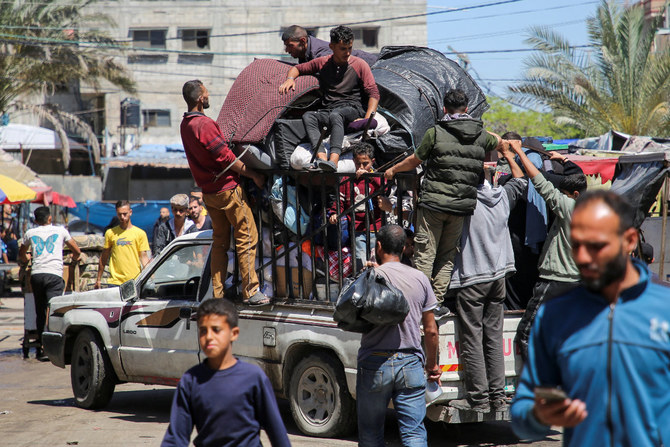
- The main hospital has shut down, leaving little care for people suffering from malnutrition, illnesses and wounds
- Rafah had 250,000 residents before the war. Its population had ballooned to some 1.4 million as people from across Gaza fled there
RAFAH, Gaza Strip: Tens of thousands of displaced and exhausted Palestinians have packed up their tents and other belongings from Rafah, dragging families on a new exodus.
The main hospital has shut down, leaving little care for people suffering from malnutrition, illnesses and wounds.
And with fuel and other supplies cut off, aid workers have been scrambling to help a population desperate after seven months of war.
As the possibility of a full-scale invasion looms, Gaza’s overcrowded southernmost city has been thrown into panic and chaos by Israel’s seizure of the nearby border crossing with Egypt.
Families uprooted multiple times by the war were uncertain where to go: to the half-destroyed city of Khan Younis, to points even farther north, or to an Israeli-declared “humanitarian zone” in Gaza already teeming with people with little water or supplies?
The past three days, streams of people on foot or in vehicles have jammed the roads out of Rafah in a confused evacuation, their belongings piled high in cars, trucks and donkey carts. All the while, Israeli bombardment has boomed and raised palls of smoke.
“The war has caught up with us even in schools. There is no safe place at all,” said Nuzhat Jarjer. Her family packed on Wednesday to leave a UN school-turned-shelter in Rafah that was rapidly emptying of the hundreds who had lived there for months.
Rafah had 250,000 residents before the war. Its population had ballooned to some 1.4 million as people from across Gaza fled there. Nearly every empty space was blanketed with tent camps, and families crammed into schools or homes with relatives. Like the rest of Gaza’s population, they have been largely reliant on aid groups for food and other basics of life.
Israel on Monday issued evacuation orders for eastern parts of the city, home to some 100,000. It then sent tanks to seize the nearby Rafah crossing with Egypt, shutting it down.

It remains uncertain whether Israel will launch an all-out invasion of Rafah as international efforts continue for a ceasefire. Israel has said an assault on Rafah is crucial to its goal of destroying Hamas after the militant group’s Oct. 7 attack on southern Israel that left 1,200 dead and 250 as hostages in Gaza.
The United States, which opposes a Rafah invasion, has said Israel has not provided a credible plan for evacuating and protecting civilians. The war has killed over 34,800 Palestinians, according to Gaza health officials, and has driven some 80 percent of Gaza’s population of 2.3 million Palestinians from their homes.
For now, confusion has reigned. Fearing a greater assault, Palestinians fled districts other than the eastern areas they were ordered to leave. Tens of thousands are estimated to have left, according to a UN official who spoke on condition of anonymity because agencies were still trying to determine precise figures.
Tent camps in some parts of Rafah have vanished, springing up again further north along main roads. New camps have filled streets, cemeteries and the beach in the central Gaza town of Deir Al-Balah, 15 kilometers (10 miles) north, as people flowed in, said Ghada Alhaddad, who works there with the aid group Oxfam, speaking to a briefing by several humanitarian workers.

Others made their way to Khan Younis, much of which was destroyed in a months-long Israeli ground assault.
Suze van Meegen, head of operations for the Norwegian Refugee Council in Palestine, said the Rafah district where she is based “feels like a ghost town.”
The Israeli military told those evacuating to go to a “humanitarian zone” it declared in Muwasi, a nearby rural area on the Mediterranean coast. The zone is already packed with some 450,000 people, according to the UN Few new facilities appear to be prepared, despite the military’s announcements that tents, medical centers and food would be present.
The ground is covered in many places with sewage and solid waste, since there are few sanitation facilities, aid workers say. Clean water is lacking and dehydration is a major problem, with temperatures some days already reaching 100 degrees Fahrenheit (38 Celsius).
The water quality is “horrifically bad. We tested some of the water and the fecal content … is incredibly high,” said James Smith, a British emergency doctor volunteering at the European General Hospital in nearby Khan Younis. Acute jaundice is rampant — and probably caused by hepatitis, but there’s no capabilities to test, he said.
The newly arrived struggle to find tents because of an extreme shortage among aid groups.
Before his family left Rafah to the zone, Iyad Al-Masry said he had to sell food received from aid groups to buy a tent for the equivalent of nearly $400.
His family set up their tent in Muwasi, smoothing the dirt ground before setting down a cradle to rock an infant in. Al-Masri said he has been searching for water and can’t afford the three shekels — a little less than $1 — that sellers charge for a gallon of drinking water.
“We want to eat … We are just waiting for God’s mercy,” he said.
Nick Maynard, a surgeon with Medical Aid for Palestinians who left Gaza on Monday, said two teenage girls who had survivable injuries died last week because of complications from malnutrition.
“They get this vicious cycle of malnutrition, infection, wounds breaking down, more infection, more malnutrition,” said Maynard.
The number of children in Rafah who have lost one or more limbs is “staggering,” said Alexandra Saieh from Save The Children. “These people cannot just pick up and relocate.”
Rafah’s main Youssef Al-Najjar Hospital evacuated on Tuesday. Smith said staff and patients rushed out even though they weren’t under evacuation orders because they feared Israeli troops would raid, just as they did hospitals in northern Gaza and Khan Younis, which were left decimated.
Israel claims Hamas used the hospitals for military purposes, an accusation Hamas and Gaza health officials deny.
Israeli tank shells Wednesday hit about 300 meters (yards) from the Kuwaiti Hospital, one of the few facilities still operating, and wounded several children, according to hospital officials.
The closure of Rafah crossing and the nearby Kerem Shalom crossing from Israel has cut off the entry of food, supplies, and fuel for aid trucks and generators. Aid groups warn they have only a few days of fuel before humanitarian operations and hospitals around Gaza begin to shut down.
Israel said Wednesday it reopened Kerem Shalom, which was shut after Hamas mortars killed four Israeli soldiers nearby, but aid groups said no trucks were entering the Gaza side. Trucks let through from Israel must be unloaded and the cargo reloaded onto trucks in Gaza, but no workers in Gaza can get to the facility to do so because it is too dangerous, the UN says.
Palestinian workers trying to reach the border crossing Wednesday were shot at, and several were wounded, the Israeli military said. It did not specify who opened fire but said it was investigating. Hamas also shelled in the area of Kerem Shalom on Wednesday, saying it was targeting nearby troops.
The UN’s World Food Program has been cut off from its Gaza food warehouse near the Rafah crossing, its deputy executive director Carl Skau said. It procured another warehouse in Deir Al-Balah, but it’s empty until crossings reopen, he said.
Van Meegen, of the Norwegian Refugee Council, said without more supplies, “how do we even begin to prioritize the dribble of humanitarian aid we have here when almost every single person is being forced to depend on it?”
Biden says US will withhold weapons from Israel if it invades Rafah
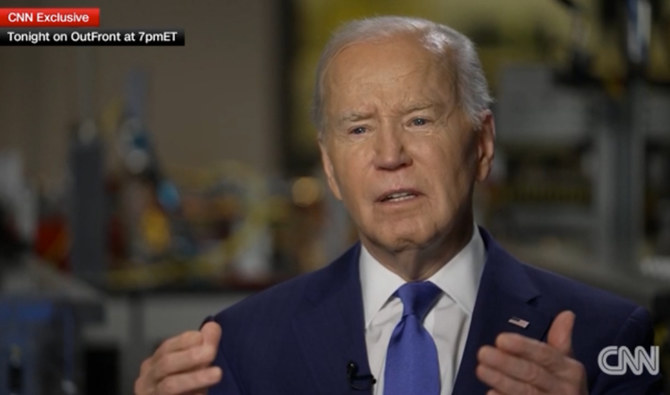
- US president admits Israel used American weapons to kill civilians
President Joe Biden on Wednesday publicly warned Israel for the first time that the US would stop supplying it weapons if Israeli forces make a major invasion of Rafah, a refugee-packed city in southern Gaza.
“I made it clear that if they go into Rafah ..., I’m not supplying the weapons that have been used historically to deal with Rafah, to deal with the cities – that deal with that problem,” Biden said in an interview with CNN.
Biden’s comments represent his strongest public language to date in his effort to deter an Israeli assault on Rafah while underscoring a growing rift between the US and its strongest ally in the Middle East.
Biden acknowledged US weapons have been used by Israel to kill civilians in Gaza, where Israel has mounted a seven-month-old offensive aimed at annihilating Hamas. Israel’s campaign has so far killed 34,789 Palestinians, mostly civilians, the Gaza Health Ministry said.
“Civilians have been killed in Gaza as a consequence of those bombs and other ways in which they go after population centers,” he said when asked about 2,000-pound bombs sent to Israel.
Israel this week attacked Rafah, where more than one million Palestinians have sought refuge, but Biden said he did not consider Israel’s strikes a full-scale invasion because they have not struck “population centers.”
A senior US official, speaking on condition of anonymity, said Washington had carefully reviewed the delivery of weapons that might be used in Rafah and as a result paused a shipment consisting of 1,800 2,000-pound (907-kg) bombs and 1,700 500-pound bombs.
The interview was released hours after Defense Secretary Lloyd J. Austin III acknowledged publicly Biden’s decision last week to hold up the delivery of thousands of heavy bombs was taken out of concern for Rafah, where Washington opposes a major Israeli invasion without civilian safeguards.
Israel’s campaign in Gaza was triggered by Hamas ‘ Oct. 7 attack on Israel. That killed about 1,200 people with about 250 others abducted, of whom 133 are believed to remain in captivity in Gaza, according to Israeli tallies.
Biden said the US would continue to provide defensive weapons to Israel, including for its Iron Dome air defense system.
“We’re going to continue to make sure Israel is secure in terms of Iron Dome and their ability to respond to attacks that came out of the Middle East recently,” he said. “But it’s, it’s just wrong. We’re not going to – we’re not going to supply the weapons and artillery shells.”



